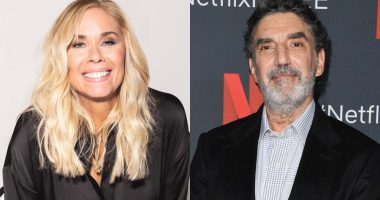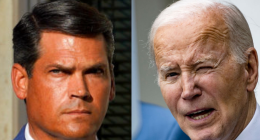
Dan Harmon says nailing down what the movie’s plot would be a decade after the show ended has been a mix of anxiety, avoidance and a tricky challenge in how to address the passage of time.
The writer and showrunner appeared on the latest episode of the Six Seasons and a Movie podcast and discussed the challenges around producing the long-awaited next chapter. During the hour-long conversation, Harmon shared how he and co-writer Andrew Guest have been grappling with returning to the show’s characters in a new decade, where audiences have grown along with their stances on comedy and topical issues like (paintball) guns in schools.
“Andrew and I just started asking ourselves what would this thing be?” he said. “The years since stopping Community have been transformative for me. So it’s not as easy as just putting my head right back up my butt and having everything be exactly where I left it. Let alone would it be as easy as that to please fans who have grown for 10 years since the show went off the air.”
The conclusion, Harmon says, was that time was not their enemy. “The sweet spot that we ended up going through philosophically was, ‘Aha! You know what everybody likes to see is that time has changed, and so have the lives of the characters and the world that we all share with them,” he said. “The character has adapted — they reacted to a changing world the same as we all have — but they are unmistakeably themselves.”
But before they reached that point, they contended with answering what, and more importantly what not, to do for the plot line — especially when it came to having the movie’s story resemble episodes from the series that were “genre homages,” like “Epidemiology” and “A Fistful of Paintballs.”
“Do we really think that it would be a good idea for the Community movie to be a paintball episode? I think it’s one of the first things to rule out because it’s the first thing off the top of your head and that’s an issue with the Community movie concept. We did a lot of episodes where, from page one to page 30, you are joyfully locked in as a construct that isn’t a traditional sitcom narrative but is, in fact, rather through the lens of David Fincher or [Martin] Scorsese or more importantly, through the lens of one of the character’s perceptions,” he said. “I got to kind of rule that out. Maybe a better writer wouldn’t.
The writer and producer noted that there was even deliberation about whether the film could attempt a story more tied to the literal reality of what happened to the show — like Greendale Community College closing down for 10 years. But doing so, he said, felt like it might make too much of the movie “unrecognizable” to Community‘s longtime fans.
“That’d be an easy, natural thing because write what you know. The campus is the show, the show’s been off the air. OK, but now, are you going to spend your movie painting and fixing windows and in abandoned hallways without students going to and fro?” he pondered. “I think that a huge part of returning to Community that the average lover of Community would want to feel is that Greendale is a place and that includes daylight, class schedules, lockers, backpacks, background actors and faculty functioning as an institution. So you’re not going to do anything terribly clever with the school.”
Despite taking things off the table, Harmon says their approach Community‘s return was a careful dance of not being reductive or repetitive, while still being familiar.
“I think it’s easy enough to say we came around to the healthy wisdom, which is we have to make sure that this movie — that it’s premise alone — doesn’t prohibit a pretty long list of things that you might want to get out of a Community movie,” Harmon added. “It’s a lot easier for me to rule stuff out than to tell you what we’re pursuing because I want people to be part of that conversation [and] maybe because I have anxiety about people thinking that I’m not thinking hard enough about something.”
He noted that some of those anxieties have “seized me,” with the producer going into a “tailspin” over whether he’s over or underthinking the plot, particularly through the lens of answering, “What do people want?” And Harmon acknowledges that he’s not the only one that’s been on the rollercoaster around trying to get this movie made “every day since the show stopped pretty much.” He pointed to how “tomorrow” in Hollywood speak isn’t a literal or consistent unit of measurement, which has complicated the long journey to the screen for fans.
“That’s what makes the movie the hard thing to talk about. It’s not so much about betraying secrets or anything like that. It’s that there’s so much there that you can’t control, certainly including timescale,” he said. “What I learned over time was you may get a little dopamine spike from sharing some good news with people, but then if a year and a half goes by, that feels like … you can passively traumatize somebody. You’re gonna project onto that like, ‘He doesn’t care,’ or ‘Nobody cares,” and ‘I was stupid to care.’”
Read More: World News | Entertainment News | Celeb News
HollyWood





